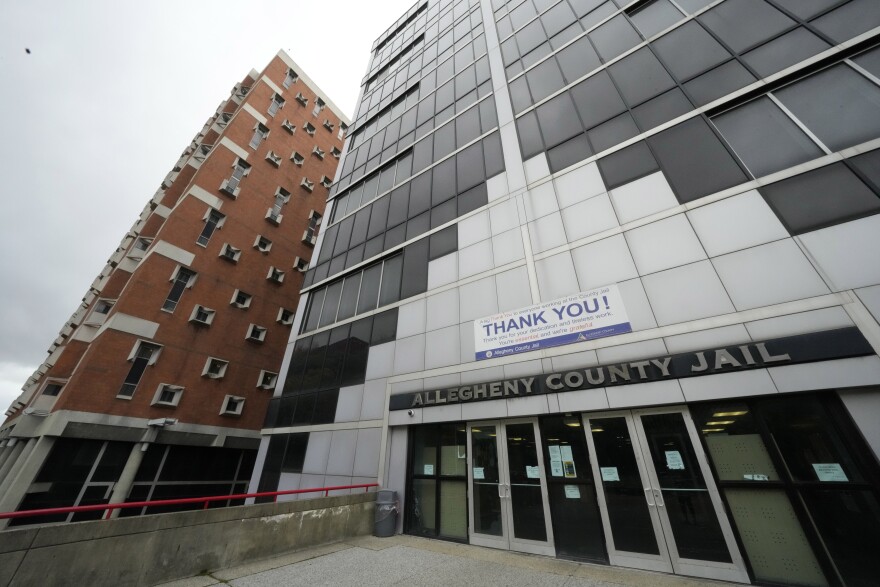Just who operates classrooms within Allegheny County Jail could soon change, as education officials review new corrective orders from Pennsylvania’s Department of Education.
The agency’s Bureau of Special Education issued a report last month ordering Pittsburgh Public Schools — the party responsible for the county’s incarcerated students — to remedy a series of issues plaguing instruction inside the jail.
The bureau found that, among other things, there was “no evidence” that students in the jail’s isolation units were receiving a “free appropriate public education,” also known as FAPE. Students with disabilities, incarcerated or not, are entitled to FAPE under the federal Individuals with Disabilities Education Act.
According to district solicitor Ira Weiss, Pittsburgh Public Schools is now reviewing multiple options for the jail’s future educational offerings. Through a contract with the school district, the Allegheny Intermediate Unit currently manages, operates and employs staff within the jail’s Academic Institute School.
Minors held inside the jail on adult criminal charges continue to receive an education at the school while awaiting a resolution to their case. As of Thursday, 21 minors were held at the jail, according to the county’s jail population dashboard.
“The District is reviewing the options available to address the findings as the program was operated by the Allegheny Intermediate Unit previously,” Weiss said in a statement. “When the District determines the manner in which the services will be provided, an announcement will be made.”
A spokesperson for the Allegheny Intermediate Unit declined to comment when reached.
Bureau report affirms attorneys’ allegations
Attorneys with the nonprofit Education Law Center filed a complaint with the state against Pittsburgh Public Schools in December. The group alleged educators systemically failed to provide incarcerated students with disabilities with services they’re afforded by law.
According to the complaint, students held in “isolation” units due to health conditions, disabilities, discipline, or a risk of being harmed did not have access to the jail school. While they sometimes received study packets, advocates said that without access to special education services, many students lost academic ground.
“The children on the isolation units were only provided with packets that were completed on their own,” said Maura McInerney, the Education Law Center’s legal director. “No special education support, no differentiated curriculum, and it became impossible for those students who might be on their way to graduation to actually be successful.”
In its report last month, the Bureau of Special Education’s report confirmed all nine of the Education Law Center’s allegations. As a result, the bureau has ordered educators to determine the extent to which each student affected by the violations is owed compensatory educational services.
The bureau said the district must also develop a procedure to ensure that students with disabilities ages 18 to 21 are provided with FAPE and compensatory services.
Students with disabilities are entitled to educational services through their 22nd birthday. But Pennsylvania requires that minors held in carceral facilities are separated by sight and sound from incarcerated adult populations.
A former Academic Institute principal told WESA that, because of that rule, students ages 18 and older couldn’t be taught in the same room as minors, even if they were entitled to the same special education services.
Once they turned 18, students were instead switched to the “packet program,” in which students are offered “self-guided study packets” or a GED program and minimal access to support from teachers.
The Bureau of Special Education’s report confirmed that, after reviewing a sample of student files, the majority didn’t meet federal special education standards.
The state also found that, for many of the 18-year-old students, their individualized education plans (IEPs) “were not delivered with fidelity.”
“Those children continue to be entitled to a free appropriate public education with all of the mandated supports in their IEPs, and access to special education teachers,” McInerney said.
Those students are also entitled to compensatory services, according to the report, and jail personnel must undergo additional training before Oct. 25, 2024.
McInerney said the systemic issues within Allegheny County Jail point to a greater need to “revamp the way that we do education in jails across the Commonwealth.”
“These issues need to be addressed now for the students who are in those [carceral] placements now,” she said. “And if they aren't, we are doing irreparable harm to all of these youth.”





